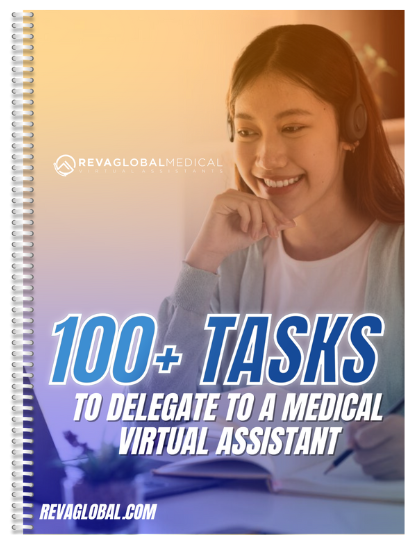Virtual Medical Assistants: The Future of Efficient and Cost-Effective Patient Care – REVA Global Medical

In today’s fast-paced, digitally connected world, healthcare systems are continuously evolving to meet growing patient demands while addressing administrative inefficiencies. One transformative solution that has emerged is the virtual medical assistant. Once considered a luxury for only large healthcare institutions, VMAs are now an essential part of medical practices, ranging from solo physicians to mid-sized clinics. They are not only redefining how healthcare professionals manage their daily workflows but also significantly enhancing patient care outcomes.
Understanding the Role of a Virtual Medical Assistant
A virtual medical assistant (VMA) is a remote professional, trained in healthcare administration and sometimes even clinical support, who assists healthcare providers in managing tasks typically performed by in-office staff. Despite the distance, VMAs play a crucial role in ensuring that medical practices run smoothly, particularly as the need for more accessible and affordable healthcare support rises.
What sets a virtual medical assistant apart from general virtual assistants is their specialized training. Most VMAs are familiar with:
- Electronic health records (EHRs)
- Medical billing and coding systems
- Transcription software
- Patient management tools
Many also receive HIPAA compliance training, ensuring they can handle sensitive patient information with the utmost confidentiality and security.
The Growing Demand for VMAs in Modern Healthcare
The healthcare industry is experiencing staffing shortages and burnout at alarming rates, especially among administrative professionals. Administrative overload not only affects staff morale but also impacts patient satisfaction and care quality. This is where VMAs make a significant difference.
With a virtual assistant taking over tasks like appointment scheduling, medical transcription, prior authorization follow-ups, and insurance claims processing, healthcare providers can redirect their energy towards clinical care. The result is a more balanced, efficient, and patient-focused practice.
VMAs are also scalable and flexible. They can work full-time, part-time, or on a project basis depending on the needs of the medical practice. Their versatility is especially valuable for clinics with fluctuating patient volumes or those expanding services without expanding physical office space.
Enhancing Patient Experience Through Virtual Assistance
Patient care does not end at diagnosis and treatment. It includes appointment reminders, follow-ups, timely billing, and answering inquiries. A delay or lack of communication in any of these areas can negatively impact a patient’s overall experience.
Virtual medical assistants contribute greatly to improving patient satisfaction by ensuring seamless communication between patients and healthcare providers. By taking over routine calls and emails, sending reminders, and managing post-visit follow-ups, VMAs allow in-house staff and clinicians to dedicate more time to direct patient interactions.
Moreover, in an age where patients expect convenience and prompt service, having a VMA handle digital communications ensures timely responses, reinforcing trust and reliability.
Clinical Efficiency and Operational Benefits
Clinics and hospitals benefit operationally from hiring virtual medical assistants in several measurable ways. One of the most compelling benefits is the reduction in overhead costs. VMAs work remotely, so there’s no need for additional office space, equipment, or in-office perks. This cost-effectiveness can be a game-changer for small practices operating on tight margins.
The efficiency gains are also considerable. Consider a scenario where a VMA is responsible for:
-
Managing patient intakes
-
Updating electronic records in real time
-
Handling insurance verifications
-
Managing follow-ups
These are tasks that would otherwise be distributed among multiple in-office staff, often leading to bottlenecks during busy periods. With a virtual assistant handling these tasks efficiently, practices can experience faster patient turnarounds, more accurate records, and smoother billing cycles. This not only enhances day-to-day operations but also contributes to long-term revenue growth.
What Qualifications Make a Great Virtual Medical Assistant?
Not every virtual assistant is suited for the complexities of medical administration. A competent VMA must have a solid understanding of medical terminology, common clinical workflows, and healthcare software platforms. In addition, they should be tech-savvy, detail-oriented, and capable of handling multiple tasks without compromising quality.
Most professional VMAs have experience working in healthcare environments and undergo training to stay up-to-date with industry standards and regulations. Communication skills are also crucial. Since they interact with both patients and medical staff, a professional tone, empathy, and clarity are indispensable.
Despite their many benefits, some healthcare professionals hesitate to integrate virtual medical assistants into their operations. The most common concerns include data security, communication barriers, and the reliability of remote work.
These concerns are valid, but they can be addressed with the right hiring strategy. Many companies that provide VMAs ensure that their personnel are:
-
Trained in HIPAA compliance
-
Using encrypted tools
-
Working from secure environments
Choosing a provider that offers managed VA services also adds an extra layer of accountability, with performance tracking and support systems in place.
Communication issues, particularly due to time zone differences or lack of in-person interaction, can be mitigated through regular virtual meetings, well-documented processes, and using collaboration tools like Slack, Zoom, or Google Workspace. In fact, many medical professionals find that once systems are in place, remote communication becomes just as seamless as in-person workflows.
Streamline your practice with a Medical Virtual Assistant
By utilizing a Medical Virtual Assistant, you can free up your time and ensure that your medical practice operates efficiently
One of the fastest-growing providers in this space is REVA Global Medical. As a branch of REVA Global—one of the top five virtual assistant companies in the real estate industry—REVA Global Medical brings a legacy of excellence and innovation to the healthcare sector.
REVA Global is known for its high-quality staffing services, boasting a remarkable 56% tenured virtual assistant workforce. This stability reflects their dedication to both clients and VAs, making them one of the most sought-after staffing agencies in the real estate industry.
Recognizing the growing need for reliable, HIPAA-compliant virtual support in healthcare, they have successfully expanded into the medical field. Today, REVA Global Medical is emerging as one of the best providers of virtual medical assistants, offering expertly trained, well-managed professionals to support medical practices of all sizes.
As digital transformation continues to reshape healthcare, the role of the virtual medical assistant will only expand. With the integration of AI, remote monitoring tools, and advanced telehealth platforms, VMAs will likely take on more sophisticated responsibilities.
For instance, a VMA might one day assist in interpreting data from wearable health devices, alerting providers to potential issues before they escalate. They could also manage patient portals, update care plans based on automated lab results, or even provide virtual patient education sessions.
In this evolving landscape, VMAs are not just support staff; they are becoming integral to proactive, patient-centered care models.
The emergence of the virtual medical assistant marks a significant shift in how healthcare providers manage operations and deliver care. By offloading time-consuming administrative tasks to trained professionals, clinicians can focus more on their patients and less on paperwork.
More than just a trend, VMAs represent a sustainable, efficient solution to the challenges facing modern medical practices. They bring cost savings, operational efficiency, and an enhanced patient experience — all while supporting the long-term growth and adaptability of healthcare organizations.
If you’re a medical professional looking to streamline your practice, reduce burnout, and improve patient care, a virtual medical assistant might be the key to unlocking your full potential in today’s healthcare environment.
Schedule Your Strategy Session!
Grow Your Brand With Trained Virtual Assistants
Get the help you need to take your brand and business to the next level.
Not Sure What Tasks To
Start Outsourcing?
We’ve got you covered.
Download our free guide to help you get started.


